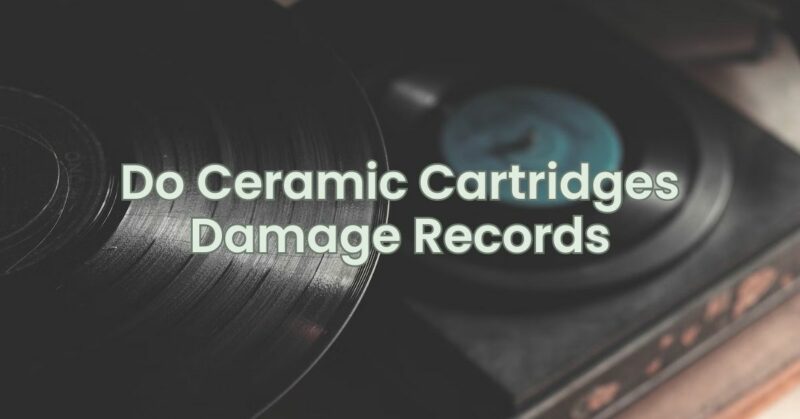When it comes to turntable cartridges, there are various types and materials available, including ceramic cartridges. However, there has been a long-standing concern among vinyl enthusiasts regarding the potential damage ceramic cartridges may cause to vinyl records. In this article, we aim to dispel the myth and address the question: Do ceramic cartridges damage records? Let’s delve into the topic and explore the truth behind this misconception.
Understanding Ceramic Cartridges: Ceramic cartridges utilize a ceramic piezoelectric element to generate an electrical signal from the mechanical vibrations of the stylus tracking the record grooves. The piezoelectric material converts these vibrations into an electrical voltage, which is then amplified to produce sound. Ceramic cartridges are often associated with entry-level turntables and offer affordability, simplicity, and ease of use.
Myth: Ceramic Cartridges Damage Records: The belief that ceramic cartridges damage records has circulated for many years. However, it is important to note that this notion is primarily based on misunderstandings and misconceptions. Let’s address some of the key concerns:
- Stylus Material: The material of the stylus itself, rather than the cartridge material, is the primary factor that can potentially cause damage to records. The stylus is the component that physically contacts the record grooves. Ceramic cartridges can be equipped with various stylus materials, including diamond, sapphire, or other hard materials. It is the choice of stylus material, its condition, and proper alignment that influence the potential for record wear, not the ceramic cartridge itself.
- Tracking Force and Alignment: One of the critical factors that affect record wear is the tracking force applied by the stylus on the grooves. Excessive tracking force or improper alignment of the stylus can lead to excessive wear and damage to records, regardless of the cartridge material. It is essential to set the appropriate tracking force and ensure proper alignment, regardless of whether the cartridge is ceramic or of another material.
- Stylus Profile: Another consideration is the shape and profile of the stylus. Some ceramic cartridges may have a conical or spherical stylus profile, which can be more prone to causing wear compared to finer-tipped profiles like elliptical or microline. However, this is a stylus design aspect rather than a direct consequence of the ceramic cartridge material.
Proper Turntable Setup and Maintenance: To ensure the preservation and longevity of your records, regardless of the cartridge type, consider the following:
- Tracking Force and Alignment: Set the tracking force and ensure proper alignment according to the manufacturer’s guidelines or consult an expert. Proper setup minimizes unnecessary record wear.
- Stylus Maintenance: Regularly inspect and clean the stylus to remove debris and dust buildup. A clean stylus ensures optimal contact with the record grooves and reduces the risk of excessive wear.
- Record Care: Handle records with care, clean them before playback, and store them in protective sleeves to minimize dust, dirt, and potential damage during handling.
- Quality Cartridge: Invest in a quality cartridge, regardless of the material, from reputable manufacturers. Quality cartridges offer better tracking ability, reduced distortion, and improved overall performance.
Conclusion: The belief that ceramic cartridges damage records is a myth rooted in misconceptions and misunderstandings. Ceramic cartridges themselves do not inherently cause damage to vinyl records. It is crucial to consider stylus material, tracking force, stylus profile, and proper turntable setup and maintenance to minimize record wear and preserve their longevity. Whether using a ceramic, diamond, or other cartridge type, proper care and attention to setup and maintenance are key to ensure an enjoyable and sustainable vinyl listening experience.


